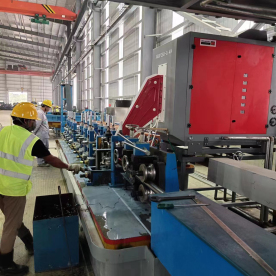[Solid state HF welder with temperature control]Exploring the Advantages and Applications of Solid State HF Welder with Temperature Control for Advanced Manufacturing Processes
News 2024-9-12
In the ever-evolving landscape of manufacturing technology, the demand for precision and efficiency has pushed engineers and manufacturers to seek innovative solutions that enhance production capabilities. One such advancement is the solid state high-frequency (HF) welder with temperature control. This technology plays a pivotal role in various industries, providing manufacturers with enhanced welding capabilities, improved control over the weld quality, and increased energy efficiency. In this article, we will explore the features, advantages, and applications of solid state HF welders with temperature control, demonstrating their significance in modern manufacturing processes.

Exploring the Advantages and Applications of Solid State HF Welder with Temperature Control for Advanced Manufacturing Processes
Solid state HF welding utilizes high-frequency electromagnetic energy to create a localized heat that melts thermoplastic materials or fuses metal components together. Unlike traditional welding techniques, which often rely on a constant voltage and current, solid state HF welding employs solid-state electronic devices to control the welding process more precisely. This innovation allows for better management of energy output, resulting in more consistent and reliable welds.
Why Temperature Control Matters
One of the standout features of modern solid state HF welders is their integrated temperature control system. The ability to regulate temperature during the welding process is paramount for several reasons:
1. **Precision:** Temperature control allows for precise management of the melting points of different materials. This precision is crucial when working with various thermoplastics, as each material has unique thermal properties. The ability to maintain optimal temperatures reduces the risk of underheating (leading to weak welds) or overheating (which can cause material degradation).

Exploring the Advantages and Applications of Solid State HF Welder with Temperature Control for Advanced Manufacturing Processes
3. **Energy Efficiency:** Traditional welding techniques often waste energy through heat dissipation and require additional time to cool down. Solid state HF welders equipped with temperature control optimize the heating process, reducing energy consumption and enhancing overall efficiency.
Key Advantages of Solid State HF Welder with Temperature Control
1. **Enhanced Control:** Solid state HF welders can provide more accurate control over the welding parameters, including time, pressure, and temperature, which leads to improved weld integrity and strength.
2. **Faster Cycle Times:** Due to the precise control of heat, the welder can operate at higher speeds with minimal cooling time. This results in faster cycle times and increased productivity on the manufacturing floor.
3. **Reduced Maintenance:** Solid state technology typically requires less maintenance than conventional arc welders. With fewer moving parts and robust electronic controls, downtime is minimized, contributing to overall operational efficiency.
4. **Versatility:** Solid state HF welders with temperature control can be employed for various applications, from welding plastics and textiles to metal joining, making them invaluable for manufacturers that work with diverse materials.
Applications in Different Industries
1. **Automotive Industry:** In the automotive sector, solid state HF welding with temperature control is used for assembling interior components, plastic fuel tanks, and electronic housing. The precision of the temperature control helps ensure strong, durable joints while reducing material wastage.
2. **Aerospace Sector:** The aerospace industry requires the highest standards of reliability and safety. Solid state HF welders are used in the production of lightweight components where precision and strength are crucial. The integrated temperature control system ensures that the material properties are preserved during the welding process.
3. **Medical Devices:** The medical device industry relies heavily on solid state HF welding for assembling components like syringe barrels and IV bags. With stringent regulatory requirements, the need for consistent and high-quality welds is paramount. Temperature control capabilities facilitate compliance with these regulations.
Conclusion

